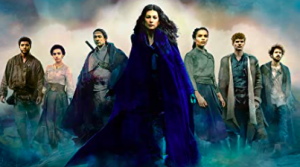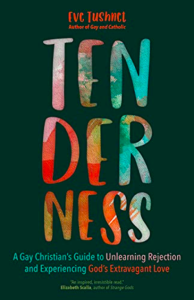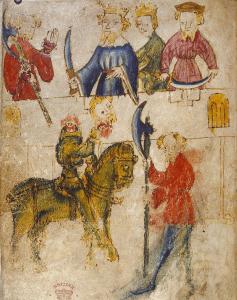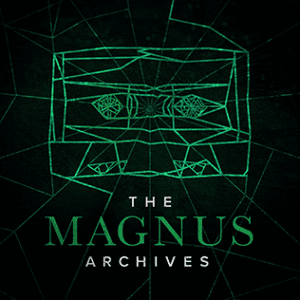After an insanely busy couple of weeks at my day job, I am back on my proverbial bull! Now that spooky season has finally rolled around again, it’s time for me to ingest some good old horror content and regurgitate it for you here, like a mother bird feeding her brood in a viral video or something. I don’t know, this analogy kind of got away from me.
The Netflix miniseries Midnight Mass, created and directed by Mike Flanagan (known for films such as Oculus and Hush and for shows such as The Haunting of Hill House), has made something of a splash. A lot of people loved it, a lot of people hated it; it’s been described as everything from a resounding defense of Christianity to a savage mockery of it. It’s only seven episodes long at about an hour each, and things that produce reactions as widely varied as that intrigue me, so over the weekend I binged it. And boy, I got things to say.
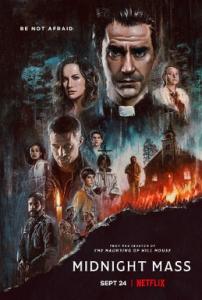
By Netflix – http://www.impawards.com/tv/midnight_mass.html,
Fair use, https://en.wikipedia.org/w/index.php?curid=68868447
Early Plot Summary (Minor Spoilers)
The plot is fairly complex, and involves multiple POV characters, so this is very boiled down.
A young man named Riley Flynn returns to his hometown, a tiny fishing village on Crockett Island (vaguely implied to be off the coast of New England), after serving a four-year sentence for accidentally killing a woman while driving drunk. Though he has lost his faith, his family and most of the village are Catholics, and he has trouble reconnecting with most people, aside from his childhood sweetheart Erin, who has also recently returned and is expecting a baby under the care of the island’s Dr. Gunning. Around the same time, a new priest arrives, Fr. Paul Hill, saying he has been sent to fill in for their aging pastor, Msgr. Pruitt. There are clear signs of tension in the community: the new sheriff, a Muslim widower from New York, clashes a number of times with Bev Keane, a very strict Catholic who teaches at the island’s public school; Bev also harbors a longstanding (and reciprocated) dislike for Joe Collie, the town drunk, who accidentally shot Mayor Scarsborough’s daughter Leeza some years ago, paralyzing her.
Shortly after Fr. Paul’s arrival, strange things soon begin happening on the island. Leeza’s paralysis is healed in the middle of Mass, and the dementia of Dr. Gunning’s devout mother Mildred is reversed. Fr. Paul starts an AA chapter at the church so Riley won’t have to travel to the mainland to keep the terms of his parole; Joe Collie eventually joins them. Erin mysteriously miscarries, and has a long conversation with Riley about his atheistic and her Christian ideas of what happens after death.
Middle and Late Plot Summary (Major Spoilers)
In secret, Fr. Paul recounts his story: he in fact is Msgr. Pruitt, attacked by a vampire (which he persistently calls an “angel”) and restored to health and youth by drinking its blood. He dies suddenly in front of Bev and Leeza’s parents, only to be as abruptly resurrected; however, he now displays vampiric traits, including his skin smoking in sunlight and an overpowering craving for blood, accidentally killing Joe Collie. Bev learns the truth, and decides that Fr. Paul’s condition is a form of holiness, the resurrection promised in the book of Revelation, justifying the harm done with Scriptural texts.
Riley also discovers the truth, accidentally walking in on Fr. Paul and the “angel,” which attacks him. Bev and Fr. Paul try to convince him to enter their cult—Bev wants to restrict his movements while he adjusts to his new condition, but Fr. Paul insists on letting him move freely around the island. Erin tries to file a missing persons report on Riley with the sheriff, but he comes to her in the night and takes her out on a rowboat well off shore, telling her the truth, begging her to flee Crockett Island, and staying until the sun comes up to prove that he is telling the truth by his death.
Horrified, Erin returns to the island and joins forces with Dr. Gunning and an increasingly youthful Mildred. The three try to escape, but the boats and ferries that could take them to the mainland are disabled on Bev’s orders. With nowhere else to go, they join most of the rest of the village at the Easter Vigil Mass, where Fr. Paul reveals the truth, bringing the “angel” in dressed in sacred vestments and inviting the congregants to drink poison so they can be resurrected as vampires. Several do, and a massacre ensues in the church as the freshly-turned pin down still-living congregants for their blood; Erin, Dr. Gunning, Leeza, the sheriff, and Riley’s mother and younger brother escape.
The massacre continues throughout the town, but Fr. Paul is horrified by the proceedings. Mildred, after being turned by the “angel,” returns to the church to talk with him, where it is revealed that Dr. Gunning is their daughter; Fr. Paul had looked on vampirism as a second chance to right the wrongs of his youth. Bev, determined to either turn or kill everyone on the island, has every building but the church and the neighboring rec center burned down. The protagonists evade her, and succeed in setting fire to the church and rec center, with Fr. Paul’s approval. Erin is tackled by the “angel,” but keeps it busy drinking her blood long enough to shred its wings with a knife; Dr. Gunning and the sheriff are shot. Shaken and aghast at what they have done, and with nowhere to hide from the sunlight, the villagers, except Bev, unite in singing “Nearer, My God, to Thee” as they accept death. Only Riley’s brother and Leeza escape, and as they are rowing for the mainland, Leeza’s paralysis returns.
The Strong Points (Here End the Spoilers, Mostly)
First of all, the acting was top notch here. Hamish Linklater, whom I’d only seen before in a forgettable sitcom, performed flawlessly as the sick, misguided, corrupt, and yet on some level sincerely well-meaning Fr. Paul Hill; his rationalization of his spiritual disease is extraordinarily true to life. The prim, faux-sweet cruelty of Samantha Sloyan as Bev Keane was remarkably good too, while Robert Longstreet’s Joe Collie and Annarah Cymone’s Leeza Scarborough were outstanding, and I’m surprised I haven’t seen them praised more for it. Atmosphere is also a strong point. My favorite example came in the sixth episode: even though “the [mode of transport] is abruptly [not going to save you for some reason]” is a typical and even stereotypical horror trope, the sudden unavailability of the ferries and fishing boats, trapping Erin and her friends on the island, was chilling.
The series’ approach to religious faith was unusually rich. In most religious horror, like The Exorcist or The VVitch, the moral and religious schemas are (1) one and the same, and (2) extremely black-and-white. The arc comes from characters committing themselves to a side in the face of resistance, not from dealing with a morally grey or religiously uncertain situation.
Midnight Mass isn’t like that at all. The only person who clearly considers piety and morality equivalent is Bev Keane, arguably the arch-villain of the piece and certainly the nastiest person on the island; atheism, Islam, and Catholicism are all depicted as systems a good, reasonable person could subscribe to in good faith. Moreover, different people respond differently to faith: people like Mildred and Leeza find not only personal hope and comfort in their beliefs, but (especially for Mildred) it makes them stronger, wiser, and more sensitive to what’s going wrong on the island; conversely, religion is the source and form of Bev’s corruption, and it does several other characters no good, silencing their rational objections even in the face of blatant crime and cruelty.
Fr. Paul’s relationship to his faith, interestingly enough, seems to be the most ambiguous. He himself blames his horrible errors and abuses not on the religious pretexts he found for them at the time, but on his overpowering desire to fix mistakes made in his youth, and on seeing his present ministry as a chance to do that—an error rooted more in personal immaturity than religious fanaticism. It’s therefore quite reasonable and satisfying that he repents before the end.
Midnight Mass also did one thing I don’t know if I’ve ever seen before: it depicts a healthy, sincere, deliberate act of forgiveness. After her healing, Leeza goes to Joe Collie’s trailer, confronts him with what he did to her and the years he took away from her, and then forgives him. Not as a power move, not to show how righteous she is, but from the heart. I don’t know if I’ve ever seen a TV show do that, certainly not in such a convincing way.
The series has been critiqued for inaccuracies in its depiction of Catholic worship, and some of those critiques are valid, but others miss the mark. I was surprised to see a number of people saying the hymns and the form of the Mass seemed very Protestant; some aspects of it are indeed strange (sometimes for story reasons and sometimes not), but the music struck me as pretty typical of an ordinary Catholic parish. There are a few nice details too, like the veiling of the crucifix during Passiontide—but this exacerbates the next section rather …
The Weak Points
Flanagan has said this was a longstanding, personal passion project, and he was raised Catholic (though he is now non-religious). It’s therefore really weird that the series makes some extremely basic mistakes about Catholic practice, the most glaring being the parish potluck, complete with hot dogs, held on Ash Wednesday—famously one of the only two days a year that both fasting most of the day and abstaining from meat are obligatory for Catholics! It doesn’t ruin the series, but it detracts from it; it’s harder to immerse yourself when you get jolted out by errors of that kind.1
More seriously, the dialogue is uneven. The family interactions are very good in both scripting and direction, but some of the other conversations get weird, especially some of the ones between Riley and Erin, which have a definite tendency to drag. There are several extended monologues in the series, some of which work better than others; Erin’s final monologue, built on the earlier conversation and quasi-debate between her Catholicism and Riley’s atheism, seems to be trying to weld the two, and the result is the dullest, most unsatisfying expression of vague undergraduate pantheism I’ve ever heard. Additionally, the all-important conversation between Fr. Paul and Mildred, though it thematically lies behind almost everything he’s done, is so understated that it feels like an afterthought. I personally also felt like Bev pulling out the “terrorist” bit in the last episode was a boringly obvious choice to make with her character, though your mileage may vary.
The show’s depiction of atheism is a little unsatisfying in general (oddly enough, given the creator and director). The only confirmed atheist of the show—and even his beliefs are slightly ambiguous by the end—is Riley; in the aforementioned conversation with Erin, the dialogue does highlight that there’s a sentimental and even somewhat self-serving element in his atheism, a craving to be free of responsibility and guilt. But, unlike the complexity that leavens the show’s portrayal of religion, there are no other clear exemplars of irreligion. The closest we really get is Dr. Gunning, who is not a regular churchgoer, but her beliefs aren’t really explored one way or the other.
The back half of the series feels like it needed another draft. Besides the dialogue issues (which only pop up some of the time), there are motivation issues for a number of characters, particularly Erin, who becomes our main POV character after Riley is taken out of the picture. Her return to the island is a stupid move, but that isn’t necessarily an issue—it’s okay for characters to do stupid things—except she then says that Riley “wanted her to help,” when this is literally and exactly the opposite of what Riley begged her to do. And when a POV character makes a stupid decision for an in-universe bad reason, especially when it’s obvious that the out-of-universe reason is “Because then the plot would end,” it’s annoying and bad. The same goes for her decision to attend the midnight Mass, and double for Dr. Gunning and Mildred, who had sworn never to set foot in the church again in the previous episode. This bulldozing of character motivation for the sake of the plot, especially in a plot that’s fairly complicated, makes the whole affair feel meandering, almost to the point of randomness. A lot of this could have been fixed by making Erin more stubbornly affirmative of her faith, even a little blinded by it—but I think Flanagan really wanted her final monologue, which wouldn’t have made any sense at all (as opposed to merely being lousy) if her character had been a more convinced Catholic.
Is It Worth Watching?
Tough call! My grade on it was a solid B, maybe a B+. I’m a huge fan of religious horror, almost regardless of what “conclusions” (if any) it comes to, so this was very much up my alley; I enjoyed it enough to wish it had been done a lot better! If you have a particular love for the genre, a special taste for morally grey explorations of religion, or just participate in all vampire media as a matter of principle, then sure, give it a whirl.
But if—and be honest with yourself now, because this is just a TV show; you’re not proving anything by watching it or not watching it—if you tend to get defensive when your religious institutions or beliefs are criticized, or if you’ve got a temporary sore spot about such things, I don’t think you’ll enjoy Midnight Mass very much. I’d also advise not watching it if you have a hard time with gore, or get triggered by abuse framed in religious terms, because there’s a good deal of both of these things in this.
1There was also a missed opportunity that I thought would have been really fun: early in the series, Fr. Paul wears a gold chasuble, and Bev calls him out on the “error” because they are in Ordinary Time, which calls for green. What few people know is that, in the Roman rite, gold can be used in place of any other color, though this is rarely done in practice except for Christmas and Easter. I was hoping Fr. Paul would drop that little tidbit, but actually he just says he couldn’t find the green chasuble, so I guess Flanagan probably didn’t know it either.
Page image provided for under fair use.







